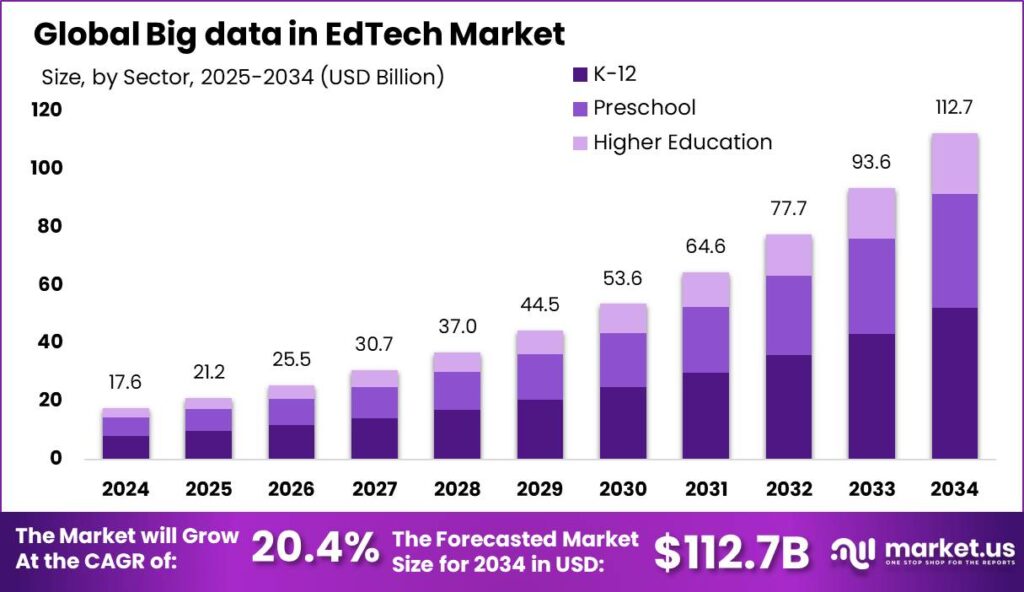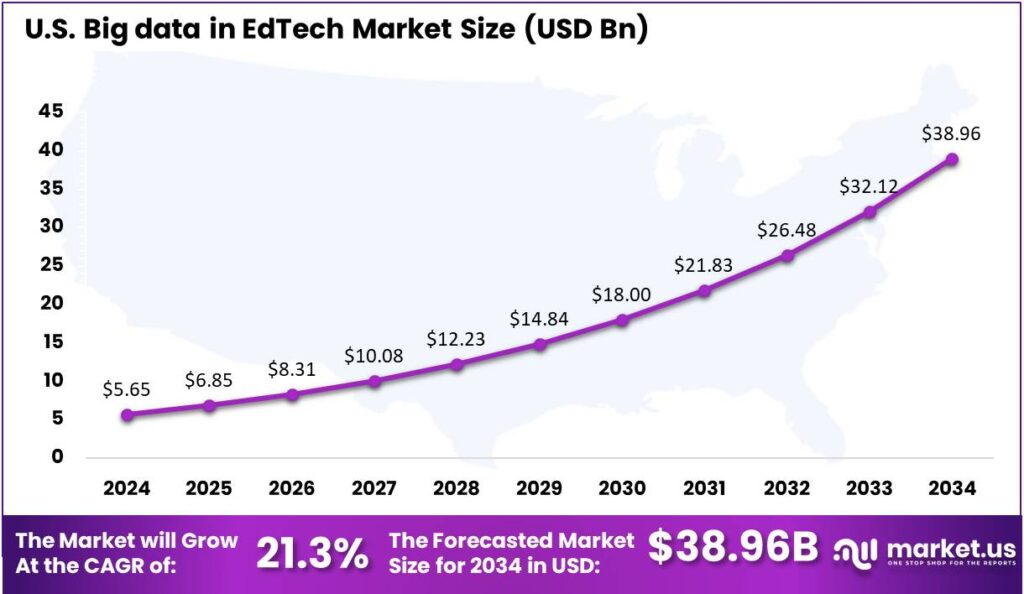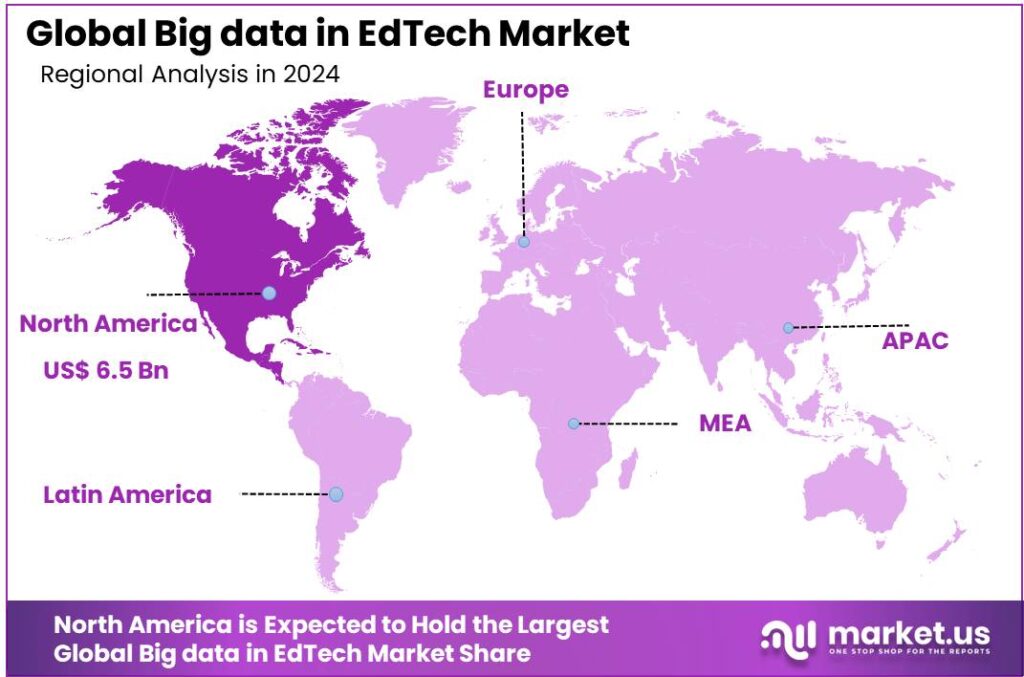Table of Contents
Report Overview
The Global Big Data in EdTech Market is on track to soar from USD 17.6 billion in 2024 to an impressive USD 112.7 billion by 2034, driven by a strong compound annual growth rate (CAGR) of 20.40% throughout the forecast period from 2025 to 2034. In 2024, North America held a dominant position, commanding more than 37.2% of the market share and generating an estimated USD 6.5 billion in revenues.
The integration of big data into the Education Technology (EdTech) sector is reshaping how educational institutions, teachers, and learners interact. The massive volume of data generated through online learning platforms, learning management systems, and student engagement activities has become a game-changer for the educational landscape. By analyzing this data, EdTech companies can make informed decisions that enhance student experiences, improve outcomes, and personalize learning journeys.
The growth of big data in EdTech is driven by factors such as the rapid digitalization of education, accelerated by the COVID-19 pandemic, and the increasing demand for personalized learning. As more schools and universities adopt online learning platforms and digital tools, the volume of data generated from user interactions and assessments grows, providing valuable insights for tailoring content to individual needs.

The EdTech sector is increasingly using big data, with predictive analytics playing a key role in identifying students at risk of failure or dropout, allowing for timely interventions to improve retention and performance. Additionally, learning analytics platforms that aggregate data from assignments, quizzes, and engagement metrics provide teachers with valuable insights, enabling them to adjust teaching methods and course content to better support student progress.
The potential for market expansion in the EdTech sector, fueled by big data, is significant. As global education systems become more reliant on technology, the need for data-driven solutions will continue to grow. Schools and universities across both developed and emerging markets are investing in EdTech solutions that can harness big data to improve student outcomes and operational efficiencies.
Analyst’s Viewpoint
The integration of Big Data into the EdTech sector is unlocking tremendous growth opportunities for both educational institutions and tech providers. As educational content and delivery systems become increasingly digitized, there is a growing demand for advanced data analytics to enhance learning outcomes and optimize operational efficiencies. Big Data allows educators to gain deep insights into student performance, behavior patterns, and engagement, which can be leveraged to provide personalized learning experiences.
Despite the promising opportunities, the adoption of Big Data in EdTech faces several challenges, including data privacy and security concerns, especially with sensitive information about minors. Ensuring compliance with regulations like GDPR and FERPA is crucial, while many schools lack the infrastructure to collect and analyze Big Data. A shortage of skilled professionals and issues with data integration further hinder progress, making it difficult and costly to extract actionable insights.
Technological innovations like AI, Machine Learning, and predictive analytics are transforming Big Data use in EdTech by helping educators identify at-risk students, predict trends, and personalize learning experiences. Learning Management Systems (LMS) are becoming more advanced, adapting content and tracking progress in real-time. Additionally, blockchain is being explored to enhance data security and transparency, ensuring verifiable academic records.
Key Takeaways
- The Global Big Data in EdTech Market is projected to grow significantly, reaching approximately USD 112.7 Billion by 2034, up from USD 17.6 Billion in 2024, with a robust CAGR of 20.40% during the forecast period from 2025 to 2034.
- In 2024, the software segment dominated the Big Data in EdTech market, capturing over 68.3% of the total market share.
- The Behavior Detection segment held a prominent position in 2024, accounting for more than 35.4% of the market share.
- The K-12 segment emerged as the largest within the Big Data in EdTech market in 2024, holding a substantial 46.4% of the market share.
- North America maintained a leading position in the Big Data in EdTech sector in 2024, representing over 37.2% of the market share, with revenues reaching approximately USD 6.5 billion.
- The U.S. Big Data in EdTech market was valued at around USD 5.65 billion in 2024, demonstrating a strong CAGR of 21.3%.
Impact Of AI
- Personalized Learning: AI helps analyze vast amounts of student data to create personalized learning paths. By looking at each student’s progress, strengths, and weaknesses, AI can recommend tailored content and study resources. This not only improves student engagement but also allows for more effective teaching strategies.
- Predictive Analytics for Student Success: AI, when paired with Big Data, allows educators to predict which students might be at risk of underperforming. By analyzing past performance data and learning behaviors, it’s possible to identify early signs of struggle and provide timely interventions before issues escalate.
- Improved Administrative Efficiency: AI systems process large datasets to help school administrators streamline operations. By automatically sorting through data on student attendance, grades, and behavior, AI reduces the workload of staff, allowing them to focus on more meaningful tasks like strategic decision-making.
- Enhanced Learning Materials and Content Creation: AI-powered tools can analyze how students interact with learning materials and provide insights into what content works best. Based on this data, AI can assist in creating more engaging and interactive content, catering to the diverse learning needs of students.
- Data-Driven Decision Making: AI in Big Data enables educators and administrators to make more informed, data-backed decisions. From assessing the effectiveness of teaching methods to identifying the best educational tools, AI transforms raw data into actionable insights, which helps improve overall educational outcomes.
U.S. Big data in EdTech Market
The U.S. Big Data market within the EdTech sector is projected to reach a valuation of approximately USD 5.65 billion by 2024. With a robust compound annual growth rate (CAGR) of 21.3%, the market is poised for significant expansion, driven by the growing demand for data-driven decision-making tools in education.
The adoption of big data tools by educational institutions to enhance learning models, streamline administrative processes, and assess student performance more accurately has become increasingly essential. Additionally, the rise of online learning platforms and educational apps that leverage big data analytics to offer personalized learning pathways has further accelerated the market’s development. As more schools, universities, and edtech companies invest in these technologies, the potential for data-driven innovations in the education sector continues to expand.

In 2024, North America dominated the Big Data in EdTech market, securing over 37.2% of the total market share. The region’s revenues reached an estimated USD 6.5 billion, reflecting its leadership in adopting and integrating advanced data analytics within educational technologies. This significant market share underscores North America’s robust investment in educational innovation, fueled by both public and private sector involvement in leveraging big data for improving educational outcomes and institutional efficiency.
North America’s advanced digital infrastructure supports widespread adoption of big data tools in education, from K-12 to higher education and corporate platforms. The presence of major EdTech companies and tech giants has fueled demand for data-driven solutions, backed by significant government initiatives and funding. This positions North America as a leader in the EdTech big data revolution, driving global trends and innovations.

Emerging Trends
- Personalized Learning: Big data allows for the creation of tailored learning experiences by analyzing individual student performance. This helps educators identify strengths and weaknesses, adjusting lessons to better suit each student’s needs. As a result, learners receive content that is specifically suited to their pace and style of learning.
- Predictive Analytics for Student Success: By using data from past performances, predictive analytics can forecast which students might struggle, giving educators early warning signs. This allows for timely interventions, ensuring that no student falls behind. Schools are able to provide additional support before issues escalate.
- Data-Driven Decision Making: Teachers and administrators are increasingly relying on data to make informed decisions about curriculum design, teaching methods, and resource allocation. This trend ensures that educational institutions invest their time and money where it matters most. The focus shifts from guesswork to evidence-backed strategies.
- Learning Analytics for Real-Time Feedback: With the help of data, students receive instant feedback on their progress, allowing them to correct mistakes and improve continuously. Real-time insights empower both learners and instructors to track performance and adjust their approach. This improves engagement and fosters a growth mindset.
- Improved Collaboration and Communication: Big data enhances collaboration between teachers, students, and even parents by providing detailed insights into student performance. This open line of communication allows for better support networks to be built, benefiting the entire learning ecosystem. It ensures everyone involved stays informed and responsive to student needs.
Top Use Cases
- Improving Graduation Rates: Colleges like Georgia State University have utilized big data to analyze the decision-making processes of students, helping them move efficiently towards graduation by predicting academic outcomes. This targeted intervention has significantly reduced the average time required for students to graduate, demonstrating big data’s role in optimizing educational pathways.
- Personalized Learning: Platforms like Knowre use big data to customize educational content, addressing individual learning gaps. This approach allows teachers to provide targeted assistance, enhancing the learning experience and improving academic performance. Personalized learning platforms analyze student interactions and adapt content difficulty accordingly, helping each student progress at their own pace.
- Enhancing Student Retention: Using predictive analytics, educational institutions can identify students at risk of dropping out and provide timely interventions. This approach leverages data on grades, attendance, and other indicators to support students in need, significantly improving retention rates and academic success.
- Content Moderation and Safety: EdTech companies employ big data analytics, natural language processing, and machine learning to moderate content and ensure a safe learning environment. These technologies can detect and restrict access to inappropriate content, maintaining a focus on educational and truthful resources. This use of big data helps maintain a positive and safe educational space for all students.
- Career and Academic Counseling: Big data analytics also aids in career and academic counseling, where platforms can provide personalized advice based on the analysis of large datasets concerning student performance and market demands. This targeted guidance helps students make informed decisions about their education and career paths, aligning their choices with real-world job market trends.
Major Challenges
- Data Privacy Concerns: Collecting vast amounts of student data raises significant privacy issues. Without proper safeguards, sensitive information can be misused or inadequately protected, leading to potential breaches.
- Integration Difficulties: Educational institutions often use diverse systems that may not seamlessly integrate. This fragmentation makes it challenging to consolidate data effectively, hindering comprehensive analysis and decision-making.
- Data Misinterpretation: Educators may lack the necessary skills to analyze complex data correctly. Misinterpretation can lead to misguided decisions that adversely affect teaching strategies and student outcomes.
- Ethical Issues in Personalized Learning: While tailoring education to individual needs is beneficial, relying heavily on data-driven algorithms can inadvertently reinforce biases or limit students’ exposure to diverse learning experiences.
- High Implementation Costs: Establishing and maintaining big data systems require substantial financial investment. Many educational institutions may struggle with the costs associated with acquiring technology, training staff, and ensuring ongoing support.
Market Opportunities
- Enhanced Student Retention Techniques: Through predictive analytics, EdTech companies can identify students who are at risk of falling behind or dropping out. Interventions can be personalized and implemented timely, significantly improving student retention and success rates in educational programs.
- Optimized Administrative Operations: Big data enables educational institutions to streamline their operations from enrollment to graduation. Analytics can help in predicting enrollment trends, managing resources more efficiently, and even in crafting marketing strategies that better meet prospective students’ interests.
- Career Alignment and Skills Forecasting: Big data analytics assist in aligning educational offerings with market needs by identifying skills gaps in the workforce. EdTech platforms can thus adjust their curriculums to better prepare students for future careers, increasing employability upon graduation.
- Real-Time Feedback for Course Adjustments: Instructors can use big data to receive real-time feedback on student engagement and understanding, allowing them to adjust their teaching methods and course content dynamically. This immediate responsiveness helps in maintaining a high quality of education and adapting to students’ needs as courses progress.
- Market Expansion and Strategic Partnerships: Big data opens up opportunities for EdTech companies to expand into new markets by analyzing trends and educational needs across different regions. Strategic partnerships with local educational institutions and governments can be formed based on insights derived from data, facilitating smoother entries into these markets.
Recent Developments
- In July 2024, Anthology launched a revamped Blackboard LMS, spotlighting AI literacy and streamlined workflows for instructors. New features like AI Conversations and advanced Mastery Learning are designed to boost student engagement and drive better learning results.
- In April 2024, Follett School Solutions expanded its reach by acquiring MasterLibrary, a company known for its integrated facilities solutions for K-12 school districts. This strategic move enables Follett to enhance its offerings, now providing schools with a full suite of services, including efficient facility management and streamlined work order systems.
Conclusion
The EdTech market has seen exponential growth driven by the integration of big data, transforming how educational content is delivered, consumed, and personalized. Big data enables educators and institutions to gain insights into student performance, learning behaviors, and preferences, facilitating the creation of customized learning experiences. By analyzing vast amounts of data, EdTech companies can refine teaching methods, enhance student engagement, and improve learning outcomes, making education more efficient and effective.
In conclusion, big data plays a pivotal role in reshaping the EdTech industry, fostering innovations that lead to smarter, data-driven educational solutions. As the market continues to evolve, the increasing use of big data will further revolutionize how learning is tailored to individual needs, driving both academic success and technological advancements. The future of EdTech is deeply intertwined with the continued growth and application of big data in optimizing educational experiences globally.
Discuss your needs with our analyst
Please share your requirements with more details so our analyst can check if they can solve your problem(s)



